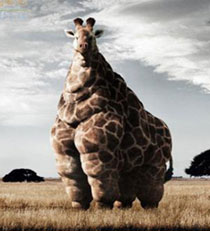人為什么會(huì)發(fā)胖?比較常見的說法是我們攝入的脂肪高于消耗掉的脂肪,所以就發(fā)胖了。但是一項(xiàng)新的研究似乎找到了更科學(xué)的原因。想要減肥的人們要注意看啦!
 The discovery of the obesity gene in humans half a decade ago offered evidence that chronic weight gain is the consequence of a mismatch between nature and nurture. Simplistic explanations, such as blaming obesity on a drop in fat consumption, ignore scientific reality. In countries like India and China, obesity was virtually unknown until the introduction of a high-fat, western-style diet.
The discovery of the obesity gene in humans half a decade ago offered evidence that chronic weight gain is the consequence of a mismatch between nature and nurture. Simplistic explanations, such as blaming obesity on a drop in fat consumption, ignore scientific reality. In countries like India and China, obesity was virtually unknown until the introduction of a high-fat, western-style diet.
One well-known reason for this is that dietary fatconverts tobody fat more efficiently than does protein or carbohydrate, but recently scientists have uncovered what appears to be an equally important factor. Some researchers in universities are investigating the possibility that high levels of fat and fructose aremucking upour brain chemistry, and thereby muting the signals that would normally tell us to put down the fork. These signals are produced by peptides, which are regulated by a number of hormones. Under normal conditions these hormones help maintain a stable body weight by adjusting levels of the peptides that control eating. But a diet loaded with fat and fructose hampers the regulation of these hormones. Complicating matters still further is that the brain loses its ability to respond to these hormones as body fat increases -- so the obese are doubly penalized.
Other researchers are finding evidence that constant exposure to fat and sugar can cause some humans tocravethem as they do an addictive drug. A Princeton University psychologist recently showed that rats fed a high sugar diet were, when the sugar was removed, thrown into a state of anxiety similar to that seen in withdrawal from morphine or nicotine. Sarah Leibowitz, a neurobiologist, believes that frequent exposure to fatty foods may configure the brain to crave still more fat. She has shown in animal studies that galanin, a brain peptide that simulates eating behavior and decreases energy expenditure, increases when the animal eats a high-fat diet.
There are many factors contributing to the explosion of obesity in the United States, and the world, but the radical changes in the composition of our diet are first among them. While scientific work in this area is in its infancy, it's already clear that varying the amount of fat and other nutrients in the diet affects brain chemistry by activating certain genes, and this in turn directs our dietary preferences. By submitting ourselves to a steady dose of highly processed, sweet, high-fat foods, we have unwittingly entered into a dangerous experiment, the long term consequences of which are only now beginning to surface.
converts to: 轉(zhuǎn)換為
muck up: 擾亂
crave: 渴望
(來源:英語閱讀網(wǎng) 實(shí)習(xí)生江巍)